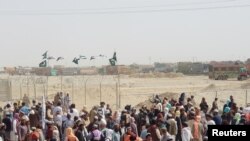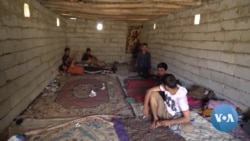The U.N. refugee agency says millions of Afghans caught in a rapidly changing and precarious situation are in desperate need of humanitarian assistance and protection and must not be forgotten by the international community.
Conflict has prompted more than 550,000 Afghans, 80 percent of them women and children, to flee their homes this year.
These newly internally displaced people are in addition to 2.9 million Afghans who have been forcibly uprooted from their homes prior to this current crisis.
The U.N. refugee agency says these vulnerable people are among 18 million who need humanitarian assistance.
The UNHCR says the situation remains highly fluid and people are extremely anxious about what the future holds, amid sporadic reports of violence since the Taliban took control of the country Sunday.
UNHCR spokeswoman Shabia Mantoo says most Afghans are unable to leave the country through regular channels. She says her agency welcomes efforts of several states to evacuate at-risk Afghan nationals through bilateral programs.
However, she says these programs should not overshadow the urgent need for a significant international response to deal with this prevailing crisis. Nor, she adds, should they hamper or preclude the possibility for Afghans to seek asylum in other countries.
"All states –and this applies to countries both within and outside the region—must preserve the right to seek asylum for Afghans arriving through regular or spontaneous means," Mantoo said. "UNHCR is also concerned that many are confusing these bilateral evacuation programs with classical refugee resettlement. This is completely unrelated.”
The United States and several NATO members have been evacuating their citizens from Afghanistan over the past few days. They also have pledged to evacuate Afghan interpreters and their families who worked alongside them for years and whose lives are in danger. The Afghans fear retribution from the Taliban because of their alliance with foreign forces.
Mantoo says few Afghans, so far, have sought asylum abroad. But given the rapidly changing circumstances, she says this could change.
“UNHCR remains concerned about the risk of human rights violations against civilians in this evolving context, including for women and girls," Mantoo said. "As of today, those who may be in danger have no way out. UNHCR is calling on countries neighboring Afghanistan to keep their borders open in light of the evolving crisis in Afghanistan.”
Neighboring Iran and Pakistan are hosting 2.4 million Afghan refugees. Most are holdovers from the decade-long Soviet-Afghan war, which began in 1979.
Some 200 UNHCR national and international staff remain on the ground in Afghanistan. Since the beginning of the year, they have provided emergency assistance to 230,000 people. The agency is issuing a supplementary appeal for $62.8 million to support this critical humanitarian operation.








